 |
 |
 |
 |
 |
 |
 |
 |
 |
Matches
14
September 2002 - Leeds United 1 Manchester United 0
Premiership - Elland Road - 39,622
Scorers: Kewell 66
Leeds United: Robinson; Mills, Woodgate, Matteo (Radebe 46), Harte; Smith, Bowyer, Dacourt, Barmby (Bakke 46); Viduka (McPhail 72), Kewell
Manchester United: Barthez; O'Shea, Ferdinand, Blanc, Silvestre; Beckham, Butt (Chadwick 63), P Neville, Giggs; van Nistelrooy (Forlán 71), Solskjaer
However, there was a little more spice than usual when the Old Trafford
club travelled to Elland Road for the Premiership fixture in September
2002, for the game represented the first return to his old club of England
centre-back and former Leeds skipper Rio Ferdinand, who had crossed the
Pennines in a record £30m deal during the close season. Ferdinand had been voted player of the year by Whites supporters. He
had enjoyed a good World Cup tournament with England in Japan and South
Korea, and speculation about a potential move had started during the finals,
with some predicting he would be on his way abroad. However, it was Manchester United who were quickly installed as favourites
for his signature, and the Reds in the England squad had plenty of time
to persuade Ferdinand of the benefits of linking up with them. The Londoner publicly denied the rumours, 'I'm happy at Leeds and that
is where I want to stay,' but talk is always cheap. Chairman Peter Ridsdale
also sought to quell the rumours: 'Let's make it perfectly clear I don't
want to sell Rio Ferdinand. He has four years left on his contract and
we bought him to be our captain and to build our team around him. We want
to build a side capable of winning trophies, but we have already spent
a lot of money to try to achieve this. If we want to continue to invest
in the team we have to make judgments on the valuation of players we bring
in and the offers we receive. As for Rio we have no offer so it is a hypothetical
question.' Manager David O'Leary was equally fixed in not wanting to lose his captain,
but hinted at the reality of the situation: 'I will talk to him about
his future now he has returned from the World Cup. I'll start by finding
out what he wants to do. Because, let's be honest, he will know all about
Manchester United. 'The bottom line is that if Rio tells me he thinks that Manchester United
are a bigger club and that he wants to go on to another level, then what
can you do? Keep an unhappy player - and an unhappy £30 million-rated
player at that? 'Manchester United could have had Rio Ferdinand for £18 million but they
didn't rate him. Now they will have to pay more than £30 million to get
him second time around, if I have anything to do with it. Demanding that
price It was partly down to O'Leary's outspoken vehemence about the possible
move that he was fired within the week, leaving the way clear for former
England boss Terry Venables to be installed as manager a couple of weeks
later, with speculation still rife about the Ferdinand deal. In the end, of course, Peter Ridsdale's resolve visibly diluted as it
became clear that Ferdinand wanted to leave and before the end of July,
a £30m fee had been agreed and the move was completed. Leeds United fans felt betrayed at the sight of another of their key
players defecting to their rivals. The name of Ferdinand was added to
a roll that included Jordan, McQueen and Cantona, although the reverse
journeys of Giles and Strachan were as galling for Manchester fans. The
Elland Road crowd were determined to make Rio's return visit an unpleasant
one and Ridsdale did nothing to quell their anger by going public about
his own feelings: 'When I first received an approach for Rio from the
Manchester United chairman, Peter Kenyon, our resolve was not to sell
him. All the speculation started after that but I can assure you that
speculation was not prompted by Leeds United. I'll leave it up to you
to decide who started it. 'I saw Rio when he came back from the World Cup. It was on the Monday
before he went off on holiday and he told me he wanted to leave the club.
That, by the way, was on the very same day he put his name to an article
in a national newspaper saying he wanted to stay. When he got back from
the holiday he then put in a written transfer request saying not just
that he wanted to leave Leeds United but that he specifically wanted to
join Manchester United. At that point we had not received an offer from
them that we considered He also quickly remodelled his version of history by claiming that Leeds
had only bought Ferdinand as an insurance policy: 'We actually bought
Rio in the first place because Jonathan Woodgate's position was uncertain
due to his involvement in what turned out to be two trials. Now Woodgate
is back, Lucas Radebe is looking sharp again and we've got Dominic Matteo
and Michael Duberry and Danny Mills who played in that position in some
of the European games. People say we have sold our best player but you
have to take a view on whether that is actually the case or not.' It was
a shallow and ill-conceived attempt at self-justification and few gave
much credibility to the claim, but it certainly increased the bad blood
surrounding the forthcoming game. For once, Leeds' form going into the game was better than their illustrious
opponents. Despite losing two of their first five matches, they were on
the crest of a wave after a stunning 2-0 victory at Newcastle and were
lying third. By contrast, Manchester United had just lost 1-0 at home
to Bolton, and were struggling to get going. Terry Venables retained the eleven with which had started at Newcastle,
with Alan Smith playing on the right side of midfield, Lee Bowyer and
Olivier Dacourt in the centre, and Nick Barmby on the left. The Aussie
duo of Mark Viduka and Harry Kewell played up front in an orthodox 4-4-2
formation. In goal, young Paul Robinson continued to be preferred to Nigel
Martyn, while the first choice defence of Mills, Woodgate, Matteo and
Harte were all present and correct. Sir Alex Ferguson's midfield was missing Juan Sebastian Veron, Roy Keane
and Paul Scholes, and chose to pair Nicky Butt and Phil Neville in the
middle, with England captain David Beckham and Ryan Giggs on the flanks,
while veteran French centre back Laurent Blanc partnered Ferdinand at
the heart of defence. There were the predictable range of banners and chants of 'One greedy
bastard', and Ferdinand was booed every time he touched the ball. However,
the cup of hatred that had been anticipated never quite brimmed over and
the England defender showed little emotion in the face of the onslaught.
However, it was clear for all to see that the form of Jonathan Woodgate
was better, mainly because most of the first half action was at the Leeds
end. Terry Venables knew as much and said so afterwards, 'I thought Woodgate
was magnificent. In the first half he held us together. He was excellent
at Newcastle, where he didn't give a single foul away all night, and he
was great again today.' It may have been one of the weakest Manchester midfields for years, but
their quartet was still strong enough to outmuscle the Leeds combination,
leaving them chasing shadows, with Venables admitting, 'They were much
better than us in the first half. We took a battering.' Indeed they did, giving Ryan Giggs the time and space to boss much of
the game. However, the Whites were resolute under pressure and withstood
the wave of assaults that engulfed them. There was even an example of
the intelligence that Venables was trying to instil in his new charges,
when they cleverly negated the threat of one of David Beckham's normally
deadly free kicks. In an obviously prearranged tactic, as the England
captain ran up to hit the dead ball, two defenders back-pedalled towards
goal and into covering positions. Thus Ian Harte was in place to chest
the goalbound effort down and clear it. It was an example of El Tel's tactical nous and Leeds had to keep thinking
on their feet as Manchester United continued to press. A corner from Beckham
provided a chance for Silvestre, but he failed to connect effectively,
and Paul Robinson saved well from a firm drive by Nicky Butt. The Manchester camp felt they were hard done by, but Joe Lovejoy of The
Times was more on the mark: 'Sir Alex Ferguson took a characteristically
one-eyed view of events. His team deserved to have won and should have
had two penalties, he said. Unsurprisingly, he was unsighted when David
Beckham elbowed Lee Bowyer in the face after 22 minutes - an offence which
caught the referee in myopic mode, too. Had Jeff Winter seen it clearly,
the One wonders what the outcome would have been if it had been Bowyer caught
elbowing Beckham rather than the other way round, because there was clear
intent in the raised arm. The reputation of Golden Balls was probably
what kept his name out of the referee's notebook. Nick Townsend of The Independent: 'Mysteriously, Beckham did not
receive a card of either hue, although Winter saw enough to award a free-kick.
Predictably, neither manager witnessed the moment clearly. Ferguson declared
"I'm sure David wouldn't do that," while Venables' contribution
was: "I remember the incident, but I can't make a judgement on it."' Leeds were fortunate in the first half, reprieved by the lack of sharpness
in Ruud van Nistelrooy's finishing, and their only chance of any note
came when Ferdinand headed wide of his own goal. They looked relieved
to come in at the interval still on level terms and Terry Venables used
the break to change things round. The 4-4-2 formation depended on Kewell and Viduka buying time when the
ball came forward to bring other players into the game, but Venables acknowledged
that it was not functioning properly: 'Harry and Mark Viduka were so good
against Newcastle, but in the first half they looked tired, and were unable
to hold the ball up. So, I laid the team out differently in the second
half to take the pressure off them.' He brought on Lucas Radebe for the injured Dominic Matteo, but the key
change was Eirik Bakke replacing the ineffectual Nick Barmby. He teamed
the Norwegian up with Olivier Dacourt in the middle and pulled Kewell
back into the left side of midfield. He then instructed Alan Smith and
Lee Bowyer to push further forward in support of Viduka, allowing things
to interchange between 4-3-3 and 4-5-1 as circumstances demanded. The changes had the desired impact, and Leeds started the second half
much better equipped to compete on equal terms, with Bowyer coming close
in the opening seconds. Bakke's physical presence made a significant difference, The incident was crucial and just three minutes later Leeds took the
lead which their improved play had hinted at. Chadwick moved out to challenge
Ian Harte, 35 yards from goal on the left and prevented him going wide
onto his favoured foot. Job done, Alex Ferguson might have thought, but
the Irish left back moved in on his right and floated over a wonderful
cross from his supposedly weaker side. Harry Kewell rose unmarked in the
middle of the area, with neither Ferdinand nor Silvestre close enough
to challenge, and flicked a clever header well clear of Fabien Barthez
and into the far corner to stun the Mancunians. It was the cue for exultant celebrations at the corner flag and excited
cries of 'Rio, Rio, what's the score?' from the partisan crowd. Leeds were determined to protect their hard won advantage and brought
Stephen McPhail on for the flagging Viduka, pushing the tigerish Smith
up front to fight a lone battle, which he did with aggression and no little
skill. Alex Ferguson was more positive with his change, withdrawing the
out of touch van Nistelrooy and throwing on Diego Forlan, although the
Uruguayan could add no more bite to the attack than the Dutchman. Smith, however, played like a man possessed and gave his opponents endless
problems. He was in on the ribs of Ferdinand at every opportunity, giving
a masterly demonstration of the art of the target man, predictably earning
a booking for a second foul on Silvestre. His performance was marvellous
to watch for the Leeds fans, and they got behind him, even forgetting
for a while to bait Ferdinand in their excitement. In the closing minutes, Ole Gunnar Solskjaer spitefully went in late
on Kewell after the Australian had cleared his lines, provoking an ill
tempered bout of pushing and shoving, which ended with Solskjaer and Ian
Harte receiving yellow cards. By now, though, Leeds were assured in their resistance of all that the
Reds had to offer, and nearly doubled their lead in the dying seconds
when Ferdinand's clearance went straight to Kewell. The Aussie took the
opportunity to create a decent angle before firing marginally wide of
the goal. It would have possibly been unfair on Manchester United, but the home
fans cheered nearly as loudly as they had when the goal went in. However,
the noise when the final whistle went after four minutes of added time
(Venables got up off the bench at one stage and shook hands with his staff,
only to discover the whistle was for a free kick) was greater than ever
as Leeds celebrated their first win over their Old Enemy since George
Graham's days. Venables was all smiles at the end, saying: 'I thought at half-time that
we'd be looking for our first win against them in 11 in the next match
because they played well and had us on the rack. But we turned it around
in the second half. The boys were absolutely outstanding. I thought in
the end we had them on the run and we deserved it. They were much better
than us in the first half and we were the better side in the second half.
After we took the lead we played the ball better and we played it earlier.
In the first half we wanted too many touches of the ball and that allowed
them to get at us.' The early kick off, arranged to accommodate live television coverage
by Sky, meant that for a few hours at least Leeds were on top of the table.
What was even more satisfying was seeing their fiercest rivals and their
former captain wallowing in the no man's land of ninth spot. It was a rare moment of elation in a season that was ultimately to become
one of the most depressing in the recent history of Elland Road. For a
time at least, however, Terry Venables could bask in the reflected glory
of his team seeing off Manchester United, knowing that it would buy him
precious time with the demanding Leeds public.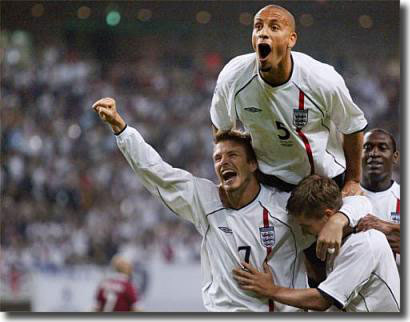 Matches
between the two Uniteds of Leeds and Manchester have never been exactly
lukewarm affairs. The antipathy between the rival sets of supporters is
intense and the atmosphere awaiting the visitors is always very hostile.
The two battles in the FA Cup semi-final of 1965, when Don Revie's brash
young side emerged to rough up Matt Busby's classy big-timers, were possibly
the nastiest clashes of all, but the passionate enmity between the fans
is a constant.
Matches
between the two Uniteds of Leeds and Manchester have never been exactly
lukewarm affairs. The antipathy between the rival sets of supporters is
intense and the atmosphere awaiting the visitors is always very hostile.
The two battles in the FA Cup semi-final of 1965, when Don Revie's brash
young side emerged to rough up Matt Busby's classy big-timers, were possibly
the nastiest clashes of all, but the passionate enmity between the fans
is a constant.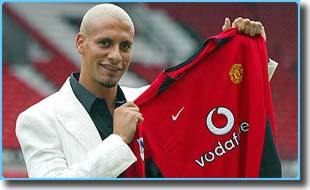 won't
be much of a consolation if he is to leave Leeds. I don't want him to
go, I am against the transfer. Ultimately, the decision rests with the
Leeds plc.'
won't
be much of a consolation if he is to leave Leeds. I don't want him to
go, I am against the transfer. Ultimately, the decision rests with the
Leeds plc.'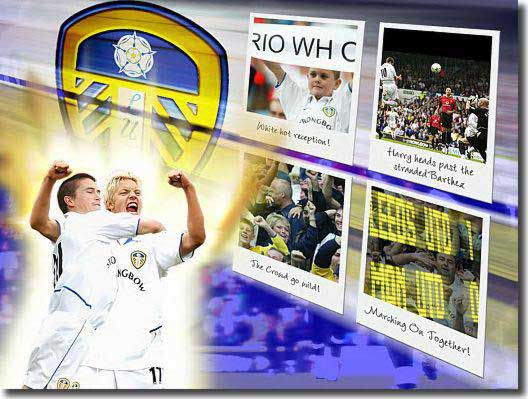 even close to being viable so it was all a bit puzzling.'
even close to being viable so it was all a bit puzzling.'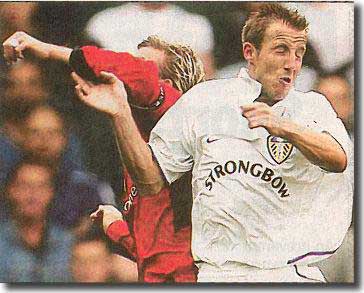 England
captain had to be red-carded. The penalty claims? Woodgate was involved
in both the incidents Ferguson had in mind. In one, Butt clearly ran into
him, in the other the contact with Ole Gunnar Solskjaer was insubstantial.
Certainly there was nothing in the game to support the United manager's
contention that "referees seem afraid to make decisions". The
ones they were giving against his paragons were "horrendous",
he added.'
England
captain had to be red-carded. The penalty claims? Woodgate was involved
in both the incidents Ferguson had in mind. In one, Butt clearly ran into
him, in the other the contact with Ole Gunnar Solskjaer was insubstantial.
Certainly there was nothing in the game to support the United manager's
contention that "referees seem afraid to make decisions". The
ones they were giving against his paragons were "horrendous",
he added.'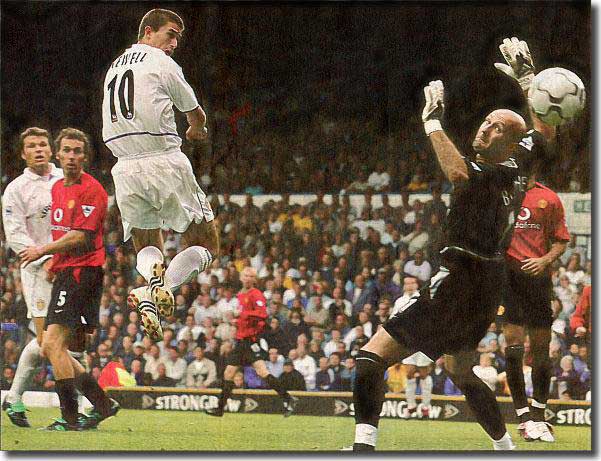 particularly after 63 minutes when he clashed with Butt, leading to the
England midfielder having to be withdrawn due to a hip injury. Luke Chadwick
replaced him, dropping into a right wing position and allowing Beckham
to move into a central role.
particularly after 63 minutes when he clashed with Butt, leading to the
England midfielder having to be withdrawn due to a hip injury. Luke Chadwick
replaced him, dropping into a right wing position and allowing Beckham
to move into a central role.